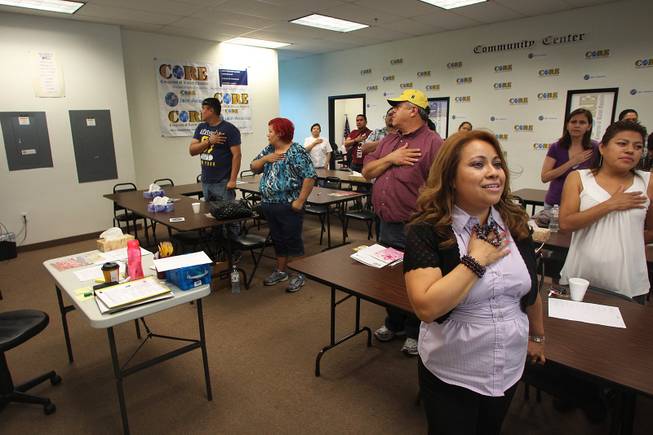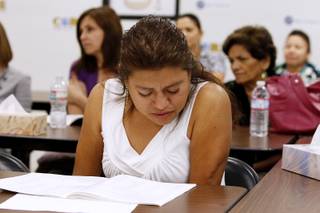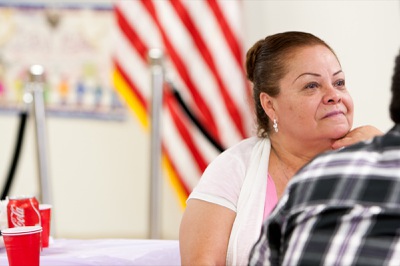
Sam Morris / Las Vegas Sun
Jackie Ramos, Congress of Racial Equality manager of community relations, faces a flag while leading the Pledge of Allegiance during her citizenship class while class participants follow along with a printed version on the opposite wall Saturday, Aug. 24, 2013.
Sunday, Sept. 1, 2013 | 2 a.m.
In 1994, Ben Monterroso paid $99, took his naturalization test and became a citizen of the United States.
Seventeen years earlier, he had left Guatemala with his family and settled in California.
While Monterroso always wanted to be a U.S. citizen, passage of California Proposition 187 — a statewide measure that barred immigrants in the country illegally from any public service, including education — spurred him to round up his family and get it done.
He remembers the moment vividly.
“It’s like being born again,” Monterroso said. “The ceremony was very emotional. You finally feel like you are part of the country and can exercise your full rights. We had the realization that without us participating, this was not going to be the country that we wanted.”
Today Monterroso is executive director of Mi Familia Vota, a national organization that encourages civic engagement and conducts citizenship workshops.
In 2012, 763,681 people became naturalized U.S. citizens. Today most naturalized citizens start as permanent residents for a period of at least five years. Then they pay $680 for application fees and biometric testing, and they must pass English and civics tests.
“I had the same issues that a lot of people today have,” Monterroso said. “I was afraid of the process. I was afraid of trusting people with my documents. I was afraid of the test.
"I was intimidated by the process, but when I went, it turned out to not be so hard.”
Some naturalize because they see it as the culmination of a lifelong love affair with an adopted country. Many people, like Monterroso, want to vote and fully participate in U.S. politics and society. Still others are motivated by different opportunities only open to citizens.
Here are the stories of three people who are on the cusp of naturalization and one immigrant who was sworn in as a U.S. citizen this summer:
Raquel Juarez
Raquel Juarez, 21, is a diminutive Guatemalan with a wide smile and energetic personality who wants to be a U.S. citizen, thanks to John F. Kennedy.
Juarez has wanted to join the Kennedy-created Peace Corps since she was in seventh grade and her neighbor was a two-term corps member.
“He later became the country director in Jordan, and knowing him and then later becoming involved in community service myself really motivated me,” Jaurez said.
A third-year UNLV student, Juarez spent her youth in schools in the Lake Tahoe area and Guatemala. Her biological parents are both Guatemalan, but Juarez’s mother divorced her father and married a U.S. citizen when Juarez was 3 years old.
She adapted to both countries, spending elementary years in California, her middle school term in Guatemala, and then back to the Nevada side of Tahoe for high school.
When her mother became a citizen two years ago, Juarez resisted the change herself, partly out of stubborn adolescence and partly out of fear of what it meant about her identity.
“To me it’s a personal battle, because I’m very connected to (Guatemala),” she said. “I feel like I’m betraying my country when I say I want to become a citizen (of the United States). But, I’ve come to the realization that’s not what it’s like.”
Raquel is studying anthropology and is interested in community development and, after college, joining the Peace Corps, which only accepts U.S. citizens.
“If I want to continue building my professional life here in the United States, I have to become a citizen,” she said. “After coming to college and joining community groups that were working with undocumented immigrants, I realized even permanent residency is a luxury a lot of people don’t have.”
In 2012 she worked on voter-registration drives and said she felt “silly” for registering others when she had not taken advantage of her own opportunity to naturalize and vote.
She's been saving money for a year and should have enough to apply soon.
“The hardest part has been gathering the money,” she said. “To a lot of people, $680 doesn’t seem like a lot, but when you are a college student with a part-time job and you have regular expenses, it can be a hefty amount.”
Having grown up in the U.S. school system, she is confident she will pass the civics test, but she still has to study up on all of her elected representatives.
“When I get sworn in, it will be for my family and my country,” she said. “The (United) States have given me so much. It’s given me a great education, it has provided opportunities to develop as a professional and work toward who I want to become. Becoming a citizen is all about who I can become now and the things I can do for my family and community.”
Nadia Gomez
Nadia Gomez’s journey to U.S. citizenship started with $1,500 paid to a human smuggler. Then it was interrupted by a three-year banishment to Mexico that resulted in depression and home foreclosure. Now she hopes it will culminate in the next few months with fulfillment of a “lifelong dream.”
Gomez, 32, a native of Michoacan, Mexico, and her sister snuck into California in 2001.
“There were not very many opportunities for us, and we wanted a better life,” Gomez said. “We figured anything would be better than where we were. We didn’t even really have the chance to go to school.”
Gomez wound up in Las Vegas, working at a Carl’s Jr. She married a citizen in 2003.
By 2006, she and her husband had three kids and a home in the northwest valley.
Immigrants who enter the country illegally but are married to U.S. citizens may petition the government for a waiver of their illegal entry so they may apply for permanent residency. Gomez had to return to Mexico while she waited on her waiver. She packed up the children and moved back to Mexico.
A lawyer filled out the initial paperwork incorrectly, resulting in a delay and the need to file a second application. Gomez did not receive permission to return to the United States until late 2009.
“I worried so much that I would never be allowed back that I was sick,” she said. “There are a lot of things that come to your mind. … What will I do if I can’t join my husband? I got depressed, and I went to the doctor for therapy.”
Before Gomez left, the family had bought a run-down house for $190,000 and invested $40,000 in renovations. The housing market was at its height.
The strain of her absence, combined with the onset of the recession and the lack of construction work for her husband, meant the family could not keep up with payments on the house or their pickup truck. The bank foreclosed and sold the house for $67,000.
In 2011, when she arrived back in Las Vegas, Gomez and her husband “started all over again.” As construction work has picked up, the family’s finances have stabilized.
After the mistake on her waiver paperwork, Gomez wanted to insure her naturalization papers were done right. She paid $300 for help, bringing the total application costs close to $1,000.
“I want to be part of this country. I’m very thankful,” she said. “I love this country, and it has given me everything. I want to vote.”
She speaks English competently but sometimes struggles to find the right words, and she is studying U.S. history and government in preparation for the citizenship tests.
“It’s pretty exciting for me. It’s going to be a lifelong dream come true. I never thought I’d be here and I’d be part of this country,” she said.
Gomez will register to vote, and she plans to enter either culinary or nursing school. Her kids will go to college and have all of the advantages she never had.
“I’ve told my daughter since the day she was born that she has to go to school, to college, and make something better of herself,” she said. “This is another life. There are so many opportunities here.”
Jennifer Franco
When UNLV graduate and Wynn front desk clerk Jennifer Franco pictures citizenship, she envisions the circular blue “I voted” sticker.
“It’s so frustrating to see people who have the right to vote but don’t educate themselves and don’t participate,” she said. “Then you see others who can’t vote, but they want a voice and have taken the time to get informed.”
Franco, 25, came with her family from Guatemala to Los Angeles when she was 3 years old.
Her mother, who worked in housekeeping, had a work permit. Her dad had come to the U.S. earlier and did general labor and construction work. At 16, Franco, who grew up in Las Vegas, received permanent residency.
“I think most native-born citizens are not even aware of what people go through,” she said. “I wish people did understand that the majority of people are not here to take your jobs and health care. We’re here to better our own lives. Unfortunately, opportunities aren’t available in Mexico, El Salvador, Honduras and Guatemala. If those countries were wealthy, people wouldn’t be coming here.
“People leave their whole lives behind – their families, their kids, everything – to come and try to make a better life. And even then it sometimes doesn’t work out, they go back, and they’re in the same spot they were before,” she said.
Franco aced her citizenship tests earlier this summer, confident after taking advanced placement U.S. history in high school, but she is still waiting for the ceremony in which she will take the oath of allegiance with other new citizens.
She is helping her mom, who gets nervous and freezes up, study for the exams.
Franco also has inspired some of her friends, assuring them the process is not too difficult.
“It’s an investment,” she said. “A lot of young people whose priorities may be jaded will say, ‘I’d rather get this purse or these shoes, or put it into my car or traveling.’ Just make those sacrifices for six months. … It’s easy and it’s a weight off your shoulders.”
Franco reminds the permanent residents she knows that they cannot truly participate in their communities until they earn citizenship.
“Come 2016, I’m so ready to get my sticker and be able to say I voted in a presidential election. I can’t wait to tell my kids one day,” she said.
She does not know the date of her ceremony yet, but she has already pictured the moment in her mind.
“I’ll definitely cry,” she said. “I’m a hugely emotional person. It should be celebrated. I don’t know if it will be a huge thing, but we’ll definitely celebrate.”
Maria Montalvo
On July 12, after 41 years in the United States, Maria Montalvo took the oath of allegiance.
“When I became a citizen, I felt like my world changed 100 percent. It was euphoria,” she said with a broad smile on her face, hands raised to the sky. “I wanted to scream from happiness and kiss the ground.”
Montalvo, 63, had been eligible to apply for citizenship for years, but was intimidated by the process. She worried her English was not quite good enough and her knowledge of U.S. history and government procedure was not strong enough.
“My husband encouraged me and always said it’s not as hard as you think,” Montalvo said.
Finally, partly motivated by watching the 2012 election cycle pass by without being able to participate, Montalvo paid the fee and hit the books.
“The most important thing for me is I wanted to vote,” she said. “I wanted to participate in the U.S. democracy because I love this country.”
Older immigrants like Montalvo are particularly intimidated by the process, since they are less likely to speak English fluently and did not go through U.S. schools. She has three children who did, though, and her son Chris helped Montalvo prep.
“I hadn’t done it before, because I was always afraid I wouldn’t pass,” she said. “Afterward, I thought to myself: ‘Why didn’t I do this a long time ago?’”
She studied for six months and took a citizenship class at the Congress of Racial Equality in Las Vegas.
Now, Montalvo is returning to the citizenship workshop to motivate others and reassure them that citizenship is within reach.
“The interviewer was very friendly and was not intimidating at all. He was an angel,” Montalvo said. “I tell them: Don’t be afraid and your dreams will come true.”



Join the Discussion:
Check this out for a full explanation of our conversion to the LiveFyre commenting system and instructions on how to sign up for an account.
Full comments policy